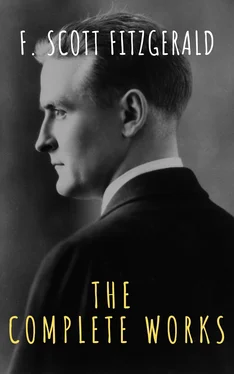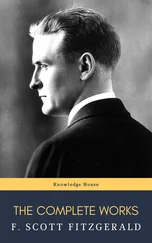“If there’s a God let him strike me—strike me!”
“Talking about God again after the manner of atheists,” Amory said sharply. His materialism, always a thin cloak, was torn to shreds by Eleanor’s blasphemy…. She knew it and it angered him that she knew it.
“And like most intellectuals who don’t find faith convenient,” he continued coldly, “like Napoleon and Oscar Wilde and the rest of your type, you’ll yell loudly for a priest on your death-bed.”
Eleanor drew her horse up sharply and he reined in beside her.
“Will I?” she said in a queer voice that scared him. “Will I? Watch! I’m going over the cliff!” And before he could interfere she had turned and was riding breakneck for the end of the plateau.
He wheeled and started after her, his body like ice, his nerves in a vast clangor. There was no chance of stopping her. The moon was under a cloud and her horse would step blindly over. Then some ten feet from the edge of the cliff she gave a sudden shriek and flung herself sideways—plunged from her horse and, rolling over twice, landed in a pile of brush five feet from the edge. The horse went over with a frantic whinny. In a minute he was by Eleanor’s side and saw that her eyes were open.
“Eleanor!” he cried.
She did not answer, but her lips moved and her eyes filled with sudden tears.
“Eleanor, are you hurt?”
“No; I don’t think so,” she said faintly, and then began weeping.
“My horse dead?”
“Good God—Yes!”
“Oh!” she wailed. “I thought I was going over. I didn’t know——”
He helped her gently to her feet and boosted her onto his saddle. So they started homeward; Amory walking and she bent forward on the pommel, sobbing bitterly.
“I’ve got a crazy streak,” she faltered, “twice before I’ve done things like that. When I was eleven mother went—went mad—stark raving crazy. We were in Vienna——”
All the way back she talked haltingly about herself, and Amory’s love waned slowly with the moon. At her door they started from habit to kiss good night, but she could not run into his arms, nor were they stretched to meet her as in the week before. For a minute they stood there, hating each other with a bitter sadness. But as Amory had loved himself in Eleanor, so now what he hated was only a mirror. Their poses were strewn about the pale dawn like broken glass. The stars were long gone and there were left only the little sighing gusts of wind and the silences between … but naked souls are poor things ever, and soon he turned homeward and let new lights come in with the sun.
A Poem that Eleanor Sent Amory Several Years Later.
“Here, Earth-born, over the lilt of the water,
Lisping its music and bearing a burden of light,
Bosoming day as a laughing and radiant daughter …
Here we may whisper unheard, unafraid of the night.
Walking alone … was it splendor, or what, we were bound with,
Deep in the time when summer lets down her hair?
Shadows we loved and the patterns they covered the ground with
Tapestries, mystical, faint in the breathless air.
That was the day … and the night for another story,
Pale as a dream and shadowed with pencilled trees—
Ghosts of the stars came by who had sought for glory,
Whispered to us of peace in the plaintive breeze,
Whispered of old dead faiths that the day had shattered,
Youth the penny that bought delight of the moon;
That was the urge that we knew and the language that mattered
That was the debt that we paid to the usurer June.
Here, deepest of dreams, by the waters that bring not
Anything back of the past that we need not know,
What if the light is but sun and the little streams sing not,
We are together, it seems … I have loved you so …
What did the last night hold, with the summer over,
Drawing us back to the home in the changing glade?
What leered out of the dark in the ghostly clover?
God! … till you stirred in your sleep … and were wild afraid …
Well … we have passed … we are chronicle now to the eerie.
Curious metal from meteors that failed in the sky;
Earth-born the tireless is stretched by the water, quite weary,
Close to this ununderstandable changeling that’s I …
Fear is an echo we traced to Security’s daughter;
Now we are faces and voices … and less, too soon,
Whispering half-love over the lilt of the water …
Youth the penny that bought delight of the moon.”
A Poem Amory Sent to Eleanor and Which He Called “Summer Storm”.
“Faint winds, and a song fading and leaves falling,
Faint winds, and far away a fading laughter …
And the rain and over the fields a voice calling …
Our gray blown cloud scurries and lifts above,
Slides on the sun and flutters there to waft her
Sisters on. The shadow of a dove
Falls on the cote, the trees are filled with wings;
And down the valley through the crying trees
The body of the darker storm flies; brings
With its new air the breath of sunken seas
And slender tenuous thunder …
But I wait …
Wait for the mists and for the blacker rain—
Heavier winds that stir the veil of fate,
Happier winds that pile her hair;
Again
They tear me, teach me, strew the heavy air
Upon me, winds that I know, and storm.
There was a summer every rain was rare;
There was a season every wind was warm….
And now you pass me in the mist … your hair
Rain-blown about you, damp lips curved once more
In that wild irony, that gay despair
That made you old when we have met before;
Wraith-like you drift on out before the rain,
Across the fields, blown with the stemless flowers,
With your old hopes, dead leaves and loves again—
Dim as a dream and wan with all old hours
(Whispers will creep into the growing dark …
Tumult will die over the trees)
Now night
Tears from her wetted breast the splattered blouse
Of day, glides down the dreaming hills, tear-bright,
To cover with her hair the eerie green …
Love for the dusk … Love for the glistening after;
Quiet the trees to their last tops … serene …
Faint winds, and far away a fading laughter …”
— ◆ —
The Supercilious Sacrifice
Atlantic City . Amory paced the board walk at day’s end, lulled by the everlasting surge of changing waves, smelling the half-mournful odor of the salt breeze. The sea, he thought, had treasured its memories deeper than the faithless land. It seemed still to whisper of Norse galleys ploughing the water world under raven-figured flags, of the British dreadnoughts, gray bulwarks of civilization steaming up through the fog of one dark July into the North Sea.
“Well—Amory Blaine!”
Amory looked down into the street below. A low racing car had drawn to a stop and a familiar cheerful face protruded from the driver’s seat.
“Come on down, goopher!” cried Alec.
Amory called a greeting and descending a flight of wooden steps approached the car. He and Alec had been meeting intermittently, but the barrier of Rosalind lay always between them. He was sorry for this; he hated to lose Alec.
“Mr. Blaine, this is Miss Waterson, Miss Wayne, and Mr. Tully.”
“How d’y do?”
“Amory,” said Alec exuberantly, “if you’ll jump in we’ll take you to some secluded nook and give you a wee jolt of Bourbon.”
Amory considered.
“That’s an idea.”
“Step in—move over, Jill, and Amory will smile very handsomely at you.”
Читать дальше












